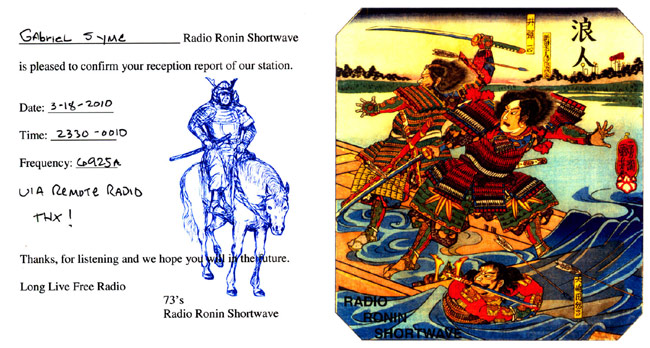And now, something completely different. It seems there is quite a kerfuffle going on in Shortwave (AKA HF) pirate land. It seems there has been some FCC enforcement action of late, leading to at least one HF pirate being closed down, while some others are pointing fingers at another saying he is a rat, or a rabbit. Or something. I dunno, it gets a little hard to follow.
Anyway…
I have written about this in the past; Pirate Shortwave broadcasting. It is a very interesting phenomenon that compels a person to gather together all the parts necessary, usually at some expense, and assemble a station. Further, keying the transmitter and broadcasting without the benefit of a license is a violation of federal law, which can bring heavy sanctions. While most pirate broadcasters seem to get a slap on the wrist, this lax FCC attitude can change. There have been several steep fines lately for repeat offenders in the FM band. At least on the FM band and somewhat the AM band too, an unlawful broadcaster is assured of some public audience. On the shortwave bands, a pirate broadcaster’s audience is limited to only those that are looking for them, which is a very narrow segment of the population.
What are they trying to accomplish? Most of the shortwave pirate broadcasts that I have listened to are limited to a couple of songs from one particular genre, send an ID and then are off. Some will send a QSL card via slow-scan TV. What compels these operators to go through all the trouble for a few minutes of irregular operation? Some of them have well-equipped studios to go along with the transmitting equipment. Then there is the clandestine nature of the undertaking, often with mail drops and spoofed e-mail addresses.
Some seem to exult in sticking it to the man, that man is the FCC, big media corporations, or any authority that tells them they are doing wrong. Acts of civil disobedience against authority are perceived (rightly or wrongly) as oppressive or evil. Others seem to have some need to perform, no matter how small the audience may be. Some are just fooling around and do it simply because they can. Finally, others like the challenge of building a low-power shortwave transmitter from scratch and seeing it through to its end.
If the so said station is broadcasting with any appreciable power, it will get noticed quickly, and sooner or later, the FCC will pay a visit. That is a foregone conclusion. The FCC has quite a few new tricks up its sleeve when it comes to direction finding and RF fingerprinting. That’s right, RF fingerprinting, is exactly what it sounds like. Super-resolution HFDF eliminates the need for triangulation, multiple vehicles, and wasting a lot of time driving around neighborhoods trying to figure out which residence an illegal broadcaster is using.
While I understand the compulsion to broadcast free radio; the need to inform under-served communities, the fact that what we used to rely on for information and news is gone, a once vibrant and exciting art form has been reduced to a hollow shell of its former self, however, we have not yet reached a Magna Carta moment. There are still some legal methods of getting the word out on the radio, both conventional and shortwave. International Broadcasting stations WBCQ and WRMI offer time-brokered programming and are pretty liberal in the types of programs they accept. Not all US shortwave broadcasters are thus, many allowing only religious programming. Those shortwave stations have large coverage areas and existing audiences. There are also many AM radio stations that will do block programming over the weekend, for a price, of course. Then there is the possibility of setting up an internet station. Eventually, the new Low Power FM (LPFM) rules will go into effect and interested groups will be able to apply for licenses in that service.
The point is, while the deck is stacked against the local or community radio broadcaster, it is still possible to get the word out in a legal way. The cost of buying block programming will likely be the same or less than buying all the equipment to set up a pirate station. Further, if the programming is compelling, you may get noticed and be able to flip the equation and actually get paid to do it.


